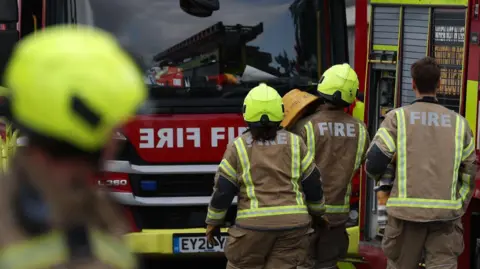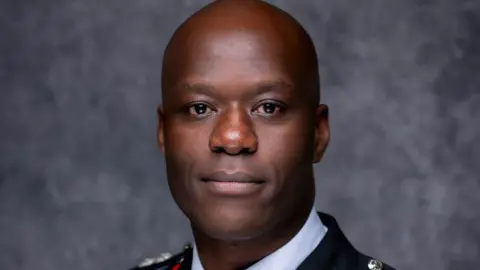Fire service 'has not made expected progress'
 EPA-EFE/REX/Shutterstock
EPA-EFE/REX/ShutterstockInspectors have found West Midlands Fire Service (WMFS) has not improved enough since its last inspection and "must make greater progress".
His Majesty's Inspectorate of Constabulary and Fire & Rescue Services (HMICFRS) said on Wednesday some areas of the service had got better and recognised it was was facing a turbulent time, but added further improvement was needed to provide a consistently good service.
The report follows several changes in leadership at the service since the death of former chief officer Wayne Brown.
Current chief officer Simon Tuhill said the findings "provide a valuable opportunity for reflection and continued improvement".
"I also recognise the need to improve in areas which have been identified, such as workforce planning, a greater diversity within the service and how we manage our budgets.
"We are already working hard to address these through our current plans and will build on this with a new action plan."
Inspector Lee Freeman said he was satisfied with some aspects of the service's performance in keeping people safe and secure from fire and other risks.
"However, it hasn't made enough progress since our 2022 inspection, and we have seen some areas deteriorate," he said.
'Unforeseen leadership changes'
Former chief Wayne Brown was found dead at his home in January 2024, a day after the fire service announced he was under investigation over claims made about his qualifications for the role.
His appointed successor, Ben Brook, then withdrew three days after getting the job.
Last autumn, the interim chief executive of the fire service and the chairman of the fire authority both resigned following a dispute over fire authority governance.
The former, Oliver Lee, had publicly alleged West Midlands Fire and Rescue Authority's (WMFRA) governance lacked "courage, transparency, care and honesty".
The inspector said: "I acknowledge the challenges the service faced at the time of our inspection. It was dealing with unforeseen changes in key leadership positions, and media stories that speculated on both the service and its governance arrangements.
"Our inspection team was still able to apply the same methodology we use for all our inspections."
 WMFRS
WMFRSWest Midlands Fire Service was graded across 11 eleven areas: four were found to be good, four were adequate, and three were graded as requiring improvement.
The fire service was found to consistently meet its five-minute response standard, providing a fast response to the public, and was also prepared to respond to major and multi-agency incidents, working well with other services during emergencies.
Furthermore, the inspectorate said the service had a supportive culture among staff and good welfare provisions were in place.
However, inspectors added: "They must make sure staff at all levels are demonstrating the service's values and behaviours."
They also said the service did not manage staff performance and development effectively.
The report added that the service must make sure it has processes in place to manage and develop staff and increase learning and development to meet their needs.
The inspectorate also said the service had faced financial challenges and needed to make improvements.
For example, it needed to make sure there was appropriate scrutiny, challenge and forecasting in place, to make sure the public gets value for money and the service is sustainable in the future.
Follow BBC Birmingham on BBC Sounds, Facebook, X and Instagram.
